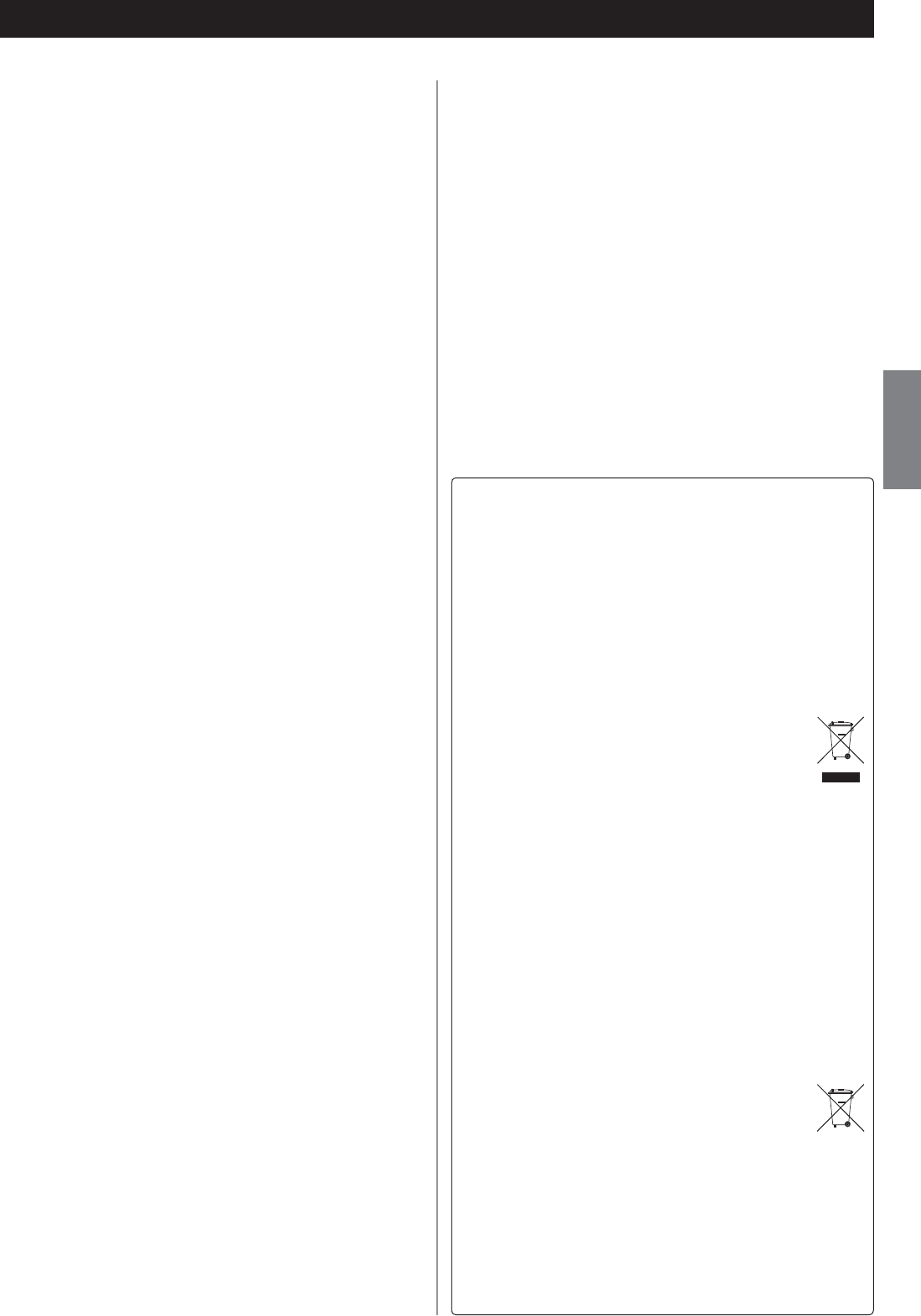
39
ENGLISH
Included Accessories
Remote control unit (RC-1257)
Batteries (AAA) for remote control unit (2)
Stereo RCA pin cables (2)
Distributor list
Owner’s manual (this document)
Quick start guide for recording
Warranty card
Design and specifications are subject to change without notice.
Weight and dimensions are approximate.
Illustrations may differ slightly from production models.
Specifications
CD Player
Pickup ................................3-beam, semiconductor laser
Digital filter ..................................8-times oversampling
Frequency response ...........................20 Hz–20 kHz ±2 dB
Total harmonic distortion ...................Less than 0.02 % (1 kHz)
Signal-to-noise ratio (S/N) .................More than 87 dB (IHF-A)
Analog output .........................................2.0 V (RCA)
Cassette tape player
Track system .............................4-track, 2-channel stereo
Heads ................Record/playback x 1 (rotary reverse), erase x 1
Type of tape ....................................Cassette tape C-60
Tape speed ............................................4.76 cm/sec.
Motor ..........................................DC servo motor x 1
Pitch control. . . . . . . . . . . . . . . . . . . . . . . . . . . . . . . . . . ±10% (playback only)
Wow and flutter ....................................0.25% (W. RMS)
Frequency response (overall) ...........50–12,000 Hz ± 3 dB, metal
50–12,000 Hz ± 3 dB, chrome
50–12,000 Hz ± 3 dB, normal
Signal-to-noise ratio (overall)
59 dB (Dolby NR off, 3% THD level, weighted),
69 dB (DOLBY NR on, over 5 kHz)
Rewinding time .......................Approx. 120 sec. (with C-60)
Input ..............Line: 87 mV (input impedance of 50 kΩ or more)
Output .............Line: 0.46 V (load impedance of 50 kΩ or more)
Headphones ......................................10 mW/32 ohms
USB
USB bus-power output ...................................5 V, 0.2 A
Playback
Frequency response .......................20 Hz–20,000 Hz (±2 dB)
Signal-to-noise ratio ...............................more than 85 dB
Playback bit rate .......................................8k-320k bps
Recording
Frequency response .......................20 Hz–15,000 Hz (±2 dB)
Signal-to-noise ratio ...............................more than 85 dB
Record bit rate ........................................... 128 kbps
General
Power requirement .................AC 230 V, 50 Hz (Europe model)
AC 220 V, 60 Hz (Korea model)
AC 120 V, 60 Hz (USA/Canada model)
AC 120 V/230 V, 50-60 Hz (General export model)
Power consumption ..........................................14 W
Dimensions (W x H x D)
435 x 145 x 288 mm (17 1/8” x 5 11/16” x 11 5/16”)
(including protrusions)
Weight (Net) ......................................5.1 kg (11 1/8 lbs)
Operating temperature ..............................+5˚ C – +35˚ C
Operating humidity ..................5% to 85% (no condensation)
Storage temperature ...............................–20˚ C – +55˚ C
For European customers
Disposal of electrical and electronic equipment
(a) All electrical and electronic equipment should be disposed of
separately from the municipal waste stream via collection facilities
designated by the government or local authorities.
(b) By disposing of electrical and electronic equipment correctly, you
will help save valuable resources and prevent any potential negative
effects on human health and the environment.
(c) Improper disposal of waste electrical and electronic equipment can
have serious effects on the environment and human health because
of the presence of hazardous substances in the equipment.
(d) The Waste Electrical and Electronic Equipment (WEEE)
symbol, which shows a wheeled bin that has been crossed
out, indicates that electrical and electronic equipment must
be collected and disposed of separately from household
waste.
(e) Return and collection systems are available to end users. For more
detailed information about the disposal of old electrical and electronic
equipment, please contact your city office, waste disposal service or
the shop where you purchased the equipment.
Disposal of batteries and/or accumulators
(a) Waste batteries and/or accumulators should be disposed of separately
from the municipal waste stream via collection facilities designated by
the government or local authorities.
(b) By disposing of waste batteries and/or accumulators correctly, you
will help save valuable resources and prevent any potential negative
effects on human health and the environment.
(c) Improper disposal of waste batteries and/or accumulators can have
serious effects on the environment and human health because of the
presence of hazardous substances in them.
(d) The WEEE symbol, which shows a wheeled bin that has been
crossed out, indicates that batteries and/or accumulators
must be collected and disposed of separately from
household waste.
If a battery or accumulator contains more than the specified
values of lead (Pb), mercury (Hg), and/or cadmium (Cd) as defined
in the Battery Directive (2006/66/EC), then the chemical symbols for
those elements will be indicated beneath the WEEE symbol.
(e) Return and collection systems are available to end users. For more
detailed information about the disposal of waste batteries and/or
accumulators, please contact your city office, waste disposal service or
the shop where you purchased them.
Pb, Hg, Cd


















